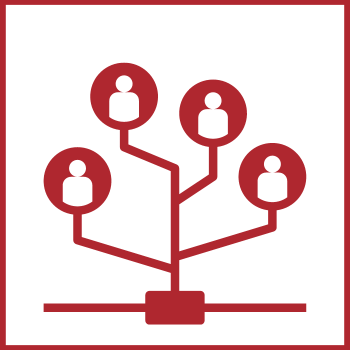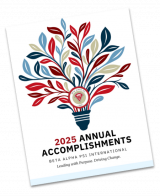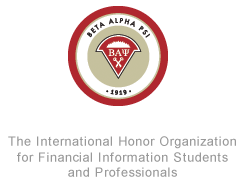
Beta Alpha Psi Best Practices Competition
Sponsored by Deloitte
Since 2001, Deloitte has proudly sponsored the Best Practices program, challenging Beta Alpha Psi chapters to design and implement projects that demonstrate leadership, professional responsibility, and service. Each year, chapters compete by showcasing innovative initiatives aligned with values shared by BAP and Deloitte.
Awards
Prizes are awarded at both Mid-Year and Annual Meetings. Winners are determined by a group of judges made up of board and Professional Partners members. Judges act independently of any student, college/university, and chapter affiliation. All funding is provided by Deloitte.
- Mid-Year: 1st place $1,000 | 2nd place $500 | 3rd place $250
- Annual Meeting: 1st place $1,500 | 2nd place $1,000 | 3rd place $500
Competition Process
- Submit your Initial Abstract Submission Form (below) by the deadline, including your first and second choice of Mid-Year Meeting locations.
- Present at only one Mid-Year Meeting if your chapter is selected.
- Advance — the top eligible finalists* (3 U.S. teams per category and the top 2 Oceania teams per category) qualify for the Annual Meeting finals.
See the events page for BAP mid-year and annual meeting dates.
Best Practices Procedure Manual
The 2025–2026 Best Practices Procedure Manual (PDF download) provides everything chapters need to participate in the competition, including program details, timelines, award levels, and presentation guidelines to help your chapter prepare a strong submission and presentation.
Deadlines
All submissions from U.S. chapters were due on Sunday, November 30, 2025 by 11:59PM ET.
All submissions from Oceania chapters are due on Sunday, December 7, 2025 by 11:59PM ET.
Submit your Initial Abstract Submission Form here.
*Eligible finalists will submit your Final Abstract Submission Form here by Sunday, May 31, 2026 at 11:59 PM ET
The following actions will result in disqualification:
- Failure to respond to any of the questions on the submission form
- Emailing your submission to your Chapter Advocate or the Executive Office
- All late submissions will automatically be disqualified
Topics
Key Points for all Categories
- Why is this a “Best Practice” and how is this different from anything done previously?
- The number of members and non-members involved in your program.
- How much time was invested in the program (planning, promoting, execution)?
- What were your expectations and goals for your program?
- How did you determine you would measure success?
- What were the challenges and how did you meet them?
- How could another chapter replicate or implement this best practice?
- Is this program new for your chapter or something that has been ongoing?
- How is your chapter planning to sustain this program in future years?
2025-2026 Best Practices Topics
Theme: Forward Together Stronger Tomorrow
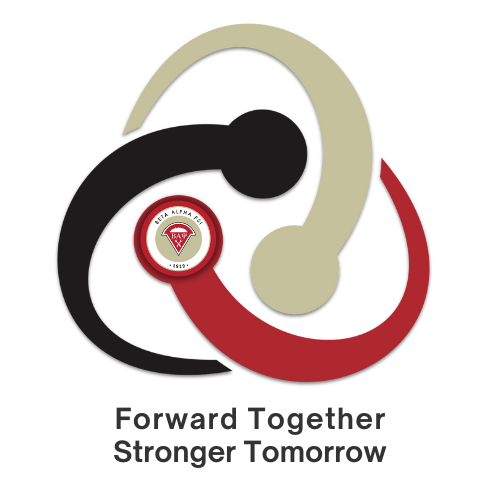
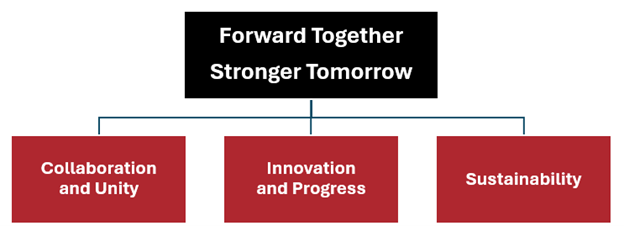
Collaboration and Unity
In a world where challenges are increasingly complex—environmental, technological, or social—no single person or group can solve them alone. Collaboration is the foundation of progress.
Unity brings together a unique set of skills, experiences, and perspectives. When combined, these help us approach problems from multiple angles and create better solutions.
Success in an evolving future depends on working together, sharing resources, knowledge, and efforts. Unity helps us tackle challenges no one can face alone.
In terms of collaboration and unity, your best practice should cover at least two of the following:
- Why is collaboration important to your chapter, and how can working together enhance the effectiveness of chapter's projects and initiatives?
- Share who your chapter has collaborated with (external partner) and what challenges you resolved together?
- What challenges have you encountered in getting different members of your chapter to work together, and how have you addressed those challenges to improve collaboration?
- How can your chapter ensure that its goals and projects consider long-term impact and sustainability, rather than focusing solely on short-term outcomes?
- In what ways can individual members contribute to the overall success of a collaborative effort within your chapter, and how can everyone’s unique skills and experiences be valued?
Innovation and Progress
The convergence between accounting, finance, and technology is accelerating. Automation, AI, cloud-based platforms, and data analytics are reshaping how financial data is recorded, analyzed, and reported. These advances also increase the importance of cybersecurity and data governance.
Moving forward often means embracing new ideas, technologies, and ways of thinking. Innovation drives positive change and helps us solve complex problems creatively.
For this topic, your submission should address one of the following:
- Describe how your chapter is fostering a culture of continuous learning to help members to better position themselves in this changing environment.
- Is your chapter integrating cutting-edge technologies in its operations? If so, describe the technology and how it is helping the chapter to innovate and move forward.
- Which professionals have your chapter engaged in innovative or emerging technologies? What professional activities have you conducted to prepare students for the workplace? Share lessons learned in your presentation.
Sustainability
Ensuring a sustainable future means creating opportunities for everyone - regardless of background or circumstances - can thrive. The challenges we face are interconnected, requiring a holistic, inclusive approach. Moving forward together means progress must benefit everyone.
Moving forward together into a sustainable future is about creating a world where all people have access to the opportunities, resources, and support they need to thrive. This is not just a moral imperative, but a practical one. Only by tackling the intersection of environmental, social, and economic issues can we create a future that is sustainable.
Moving forward together means ensuring that no one is left behind.
In this best practice, your submission must address the first item and one additional item.
- Describe what sustainability means to your chapter?
- Has your chapter adopted a framework such as the United Nations’ Sustainable Development Goals to drive initiatives?
- Discuss what your chapter is doing to ensure a sustainable future. Be sure to include your short and long-term goals, actions taken to achieve those goals, and any sustainable materials or processes developed to share with future officers, and how you measure success.
Hear what our Professional Partners think about BAP!
Supporting BAPSi means investing in the future of business—empowering students with the education, resources, and opportunities they need to grow into tomorrow's leaders.
Kelly Rath
Managing Director, Talent Acquisition – Early Career
Andersen




